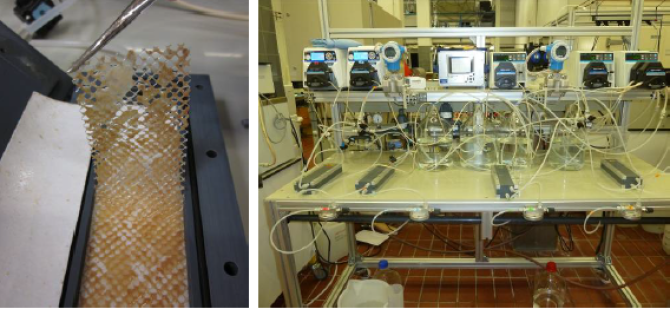Thesis subject
Physiological properties of defined mono- and mixed culture biofilms associated with membrane biofouling
High quality drinking water, free of (in)organic contaminants and pathogens, can be produced with reverse osmosis (RO) membrane filtration. Maintenances and operational costs of membrane filtration installations are strongly affected by fouling. Fouling is the undesired accumulation of material within the membrane elements, causing a drastic decrease in system performance and/or water quality.

Biological fouling, caused by the deposition and growth of microorganism, is the major type of fouling occurring in RO membrane filtration elements. Biofouling problems in RO units are thought to be due to biomass accumulation on RO membrane surfaces and/or blockage of spacers.

We have reasons to assume that biofouling on RO membranes cannot directly be linked to biofilm formation. Clearly, biofilms grown under unlike conditions (e.g. C-N-P ratio or dosing of biocides) can show a different degree of biofouling due to the strong complexity in possible biofilm structures. There is a strong need for defined monoculture and mixed culture biofilms studies, to understand when a biofilm is turning into biofouling.
Aim
With the present research we aim to study key physiological properties (e.g. attachment/detachment, resistance to chemical cleaners, EPS production) of selected “biofouling” microorganisms (e.g. Sphingomonas sp.) grown in lab-scale flow cells.
Techniques and Methods
- Building and testing of a monoculture flow cell set-up (e.g. FisH, UV-disinfection)
- Growth of monoculture and defined mixed cultures in lab-scale flow cells
- Determination of basic physiological properties (e.g motility, pH and temperature resistance)
- Space for own ideas and experiments (e.g. using: GC, HPLC, SEM, AFM, Raman)
More information
This project is mainly designed for an MSc thesis (6 months), yet it is possible to have a short term (4 months) project. This project aims to give students experience with growing cultures in anaerobic conditions, working with different microbial and molecular techniques and data analysis. Please do not hesitate to contact us for further information.
Project for Bsc and/or Msc students with interest in applied environmental microbiology. The research is performed at the laboratories of Wetsus in Leeuwarden, NL.
Supervisor: Florian Beyer
Contact info: Florian.Beyer@wetsus.nl
Tel: 058-2843179
Biofouling Workgroup
Wetsus, Leeuwarden
www.wetsus.nl
Duration: 4-6.5 months
Credits: 39 (max.)